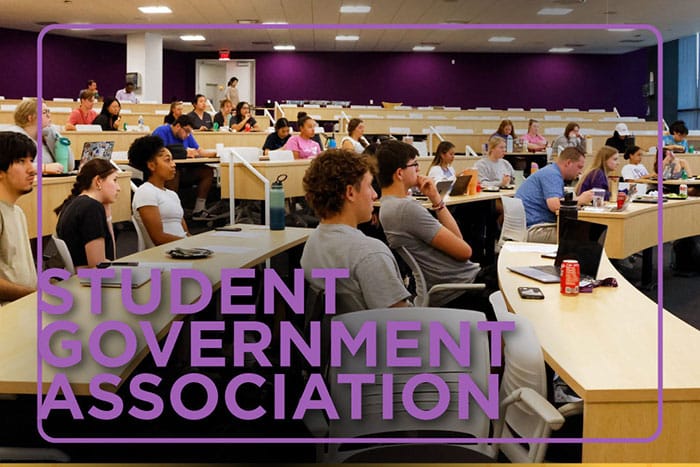
Be the Change: Student Government Association at UHSP
On the campus of University of Health Sciences and Pharmacy in St. Louis, the Student Government Association (SGA) serves as the voice of students. From addressing practical concerns like cafeteria hours and exam schedules, to advocating for improved student engagement spaces on campus, SGA is focused on improving the student experience and paving the way for students to be the change at UHSP.
The What: SGA’s Mission and Purpose
The Student Government Association plays a crucial role in supporting the student community by working closely with faculty and staff committees to ensure that student voices are part of the decision-making process.
“SGA aims to represent the diverse student body and address their concerns through various initiatives,” explained senior Michelle Le, SGA executive vice president. “We also help first-year students transition to college life and engage in both academic and social activities.”
Acting as a bridge between students and the university administration, SGA helps address student concerns by serving as a liaison with the University’s Board of Trustees and the University Leadership Team. SGA is also tasked with managing event budgets and assisting with issues like adjusting testing schedules and cafeteria operation times.
The Who: Meet the Student Leaders Behind SGA
SGA holds elections that align with the academic year. Campaigns are run, and the entire student body participates in voting through a nomination and ballot process. The general body includes all elected officers, class representatives and committee members, totaling around 50 students who work together to represent the student voice.
The SGA Executive Board is made up of seven elected members, each responsible for various aspects of student governance. These roles include:
○ President
○ Executive Vice President
○ Vice President of Graduate Studies
○ Vice President of Undergraduate Studies
○ Secretary
○ Treasurer
○ Director of Public Relations
“Each board member has specific responsibilities, but together we act as the face of SGA,” explained professional student Clara Macheras, SGA president. “We oversee general body elections, manage budget requests and advocate for students when issues arise.”
To serve on the Executive Board, students must first gain experience as class representatives. Class representatives are elected to voice their peers’ concerns and ideas within student government. Through their efforts, members of the Executive Board gain a solid foundation in advocacy and leadership.
The Why: Why SGA Matters for Every Student
SGA gives students a platform to voice their concerns and make a tangible impact on campus life.
“Being part of SGA is about being an advocate, whether it’s at a professional level or advocating for a class, we’re focused on speaking our mind on behalf of our fellow students,” noted professional student Summer Roesch, SGA treasurer.
SGA fosters a sense of community among students, helping them to connect not only with their peers but also with faculty and staff. It’s a great way to meet new people and the organization also plays a direct role in shaping the campus environment.
“We wanted more social spaces, so we advocated for the addition of a fire pit and other new areas on campus like Eutopia,” said senior Dawson Hilligoss, SGA vice president of undergraduate studies. “These spaces were added because of SGA’s efforts.”
Finding a genuine passion is key to making a meaningful impact through student involvement, which is why SGA can be a good fit for students.
“It’s important to find something you’re truly passionate about rather than joining clubs just to build a résumé,” noted professional student Sydney Smith, SGA vice president of graduate studies. “When you’re part of a group you genuinely care about and are passionate about making a difference in, you’ll feel more excited about your role and more driven to lead. That’s what makes SGA so exciting for me.”
The How: How to Get Involved and Make a Difference
SGA elections are the first step for students looking to get involved. Each year, students are invited to nominate their peers. Available positions include class president, vice president and senators. Students vote through class ballots, and the election process is facilitated by faculty to increase student engagement and ensure a smooth voting process.
“If you’re interested in running for an SGA position, fill out a nomination form when elections are announced,” said Macheras.
For students who aren’t ready to run for an executive position, there are other ways to contribute to SGA’s mission. Serving as a class representative or joining one of SGA’s various committees provides opportunities for involvement and leadership development while working on initiatives that shape campus life.
The When: When to Join and Participate
Students can get involved with the Student Government Association during the spring semester of each academic year when elections are held for executive positions and class representatives. Incoming first-year elections take place in the fall. Nomination forms are usually distributed through student emails, campus announcements and online platforms, detailing available positions, eligibility and deadlines, sent out early in the year.
“Social media plays a key role in spreading the word about SGA elections and getting students involved,” explained professional student Amanda Cun, SGA director of public relations. “It’s a powerful platform for sharing who we are, what we stand for, and the impact SGA has on the community.”
SGA encourages all students to get involved and use their leadership roles, whether big or small, to make a difference.
As Le put it, “Be the change you want to see. By using your platform in an organization like SGA you can advocate for issues that matter and help shape a better future for yourself and your peers.”
It’s important to find something you’re truly passionate about rather than joining clubs just to build a résumé. When you’re part of a group you genuinely care about and are passionate about making a difference in, you’ll feel more excited about your role and more driven to lead. That’s what makes SGA so exciting for me.
Sydney Smith, Professional Student, SGA Vice President


